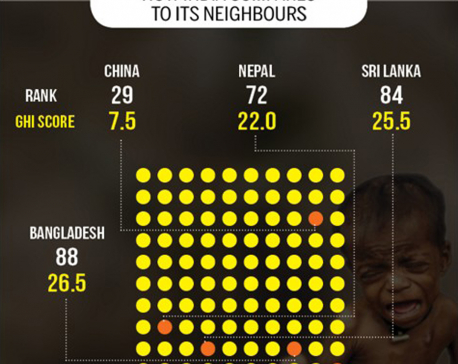
OR
Scientists explore why people get ‘Hangry’ in new study
Published On: October 1, 2018 01:00 PM NPT By: Agencies

Scientists in Canada exploring the “hangry” phenomenon have found a link between hunger and mood swings.
“Hangry” refers to the expression that people started using to refer to their irritable mood that would arise with the feeling of hunger.
Researchers at the University of Guelph in Canada went ahead to observe the moods of hungry mice, theorizing that a drop in blood sugar, which accompanies hunger, would result in a downward change in mood.
“When people think about negative mood states and stress, they think about the psychological factors, not necessarily the metabolic factors,” said Ph.D. student Thomas Horman, the study’s leader, in a press release. “But we found poor eating behavior can have an impact.”
The condition of having low blood sugar is also known as hypoglycemia. For the study, rats were injected with a glucose metabolism blocker to induce feelings of hunger, and placed in a specific chamber. They were also injected with water and placed in another chamber.
Researchers found that the rats avoided the chamber where they were injected with the blocker.
“This type of avoidance behavior is an expression of stress and anxiety,” said Prof. Francesco Leri from the university’s Department of Psychology in the press release. “The animals are avoiding that chamber because they had a stressful experience there. They don’t want to experience it again.”
The researchers are hoping to find out if there is a long-term impact on a person’s psychological state when meals are repeatedly skipped.
“Poor mood and poor eating can become a vicious cycle in that if a person isn’t eating properly, they can experience a drop in mood, and this drop in mood can make them not want to eat. If someone is constantly missing meals and constantly experiencing this stressor, the response could affect their emotional state on a more constant level,” Horman explained.
Another Theory on ‘Hangry’
A study published in June also investivated the “hangry” phenomenon. That study was done by researchers from the University of North Carolina at Chapel Hill, and published by the American Psychological Association (APA).
“You don’t just become hungry and start lashing out at the universe,” Assistant Professor Kristen Lindquist, co-author of the study, said in a statement. “We’ve all felt hungry, recognized the unpleasantness as hunger, had a sandwich and felt better.”
“Poor mood and poor eating can become a vicious cycle in that if a person isn’t eating properly, they can experience a drop in mood, and this drop in mood can make them not want to eat. If someone is constantly missing meals and constantly experiencing this stressor, the response could affect their emotional state on a more constant level,” Horman explained.
Another Theory on ‘Hangry’
A study published in June also investivated the “hangry” phenomenon. That study was done by researchers from the University of North Carolina at Chapel Hill, and published by the American Psychological Association (APA).
“You don’t just become hungry and start lashing out at the universe,” Assistant Professor Kristen Lindquist, co-author of the study, said in a statement. “We’ve all felt hungry, recognized the unpleasantness as hunger, had a sandwich and felt better.”
You May Like This

Infographics: Global hunger index reveals that hunger gnaws India
Global hunger index reveals that hunger gnaws India ... Read More...

Five reasons why you should opt for a ‘smaller wedding’ this season
Nepalese love the ‘big fat weddings’. So many delicacies to gorge on, so many gossips to toss around. From kids... Read More...

Dr KC starts fresh hunger strike
KATHMANDU, Nov 13: Senior orthopedic surgeon at Tribhuvan University Teaching Hospital (TUTH), Dr Govinda KC on Sunday started his tenth... Read More...





_20220508065243.jpg)


Just In
- Over 400,000 tourists visited Mustang by road last year
- 19 hydropower projects to be showcased at investment summit
- Global oil and gold prices surge as Israel retaliates against Iran
- Sajha Yatayat cancels CEO appointment process for lack of candidates
- Govt padlocks Nepal Scouts’ property illegally occupied by NC lawmaker Deepak Khadka
- FWEAN meets with President Paudel to solicit support for women entrepreneurship
- Koshi provincial assembly passes resolution motion calling for special session by majority votes
- Court extends detention of Dipesh Pun after his failure to submit bail amount










Leave A Comment